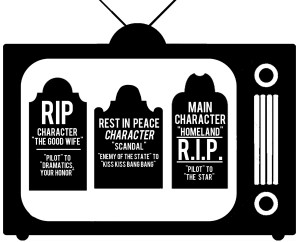TV shows must rethink killing off main characters
Before you read this column, I should tack on a giant spoiler alert warning. Whether you’re a good student waiting to watch your favorite show until after midterm season or, if you’re like me, and throw caution to the wind with too many shows to watch in one sitting, none of us like spoilers. They ruin the surprise of any plot twist, especially when it comes to what seems like television’s ever-recurring trend — killing off a beloved character. So, once again, spoiler alert.
A shocking death happened on last week’s episode of The Good Wife, a serial political and legal drama about the first lady of Illinois, Alicia Florrick, who is tired of her domestic role. At the epicenter of the show is the relationship between Alicia and her lawyer colleague, Will Gardner. Gardner, sadly, was caught in the middle of a courtroom shooting, shocking viewers and demolishing any chances of the protagonists getting together. Critics were divided about the validity of this killing. Some praised the show for taking risks with the new direction, while others predicted an inability to recover from such a startling storyline.
I am no stranger to my favorite characters being killed off of shows — flashback to a couple years ago when Lexie Grey was killed off of Grey’s Anatomy. When that happened, I went through the seven stages of denial, swearing off the show because of emotional trauma. It was mirrored this past year by the season finale of Homeland, in which lead character Nicholas Brody was hanged for foreign war crimes. Two weeks ago, Scandal saw James Novak shot for trying to expose the government. However essential television writers might consider the death of a character, it is sometimes detrimental and unnecessary for plot development.
I do acknowledge the practical purposes for the demise of characters on television shows. Perhaps the actor who plays the character unfortunately died in real life, such as when Glee writers killed off the character Finn Hudson following the death of actor Cory Monteith last July. When something as tragic as that happens, it’s respectable to pay homage to the actor for what he or she contributed to the show. I also can’t go on without addressing how the actor Josh Charles, who plays Will Gardner, wanted to leave the show after last season but was persuaded by his co-star Julianna Margulies, who plays Alicia, to go on for more episodes this season. His character being written off is pragmatic on the one hand, but on the other, when an established show that has lost its hype tries to zest up its storylines with the death of a character, it’s less than admirable. To me, it seems like a cop-out.
To add depth to a show by manipulating a character’s shelf life is to cut off any possibility of future developments for that specific character. It can be very simple deciding to end a character’s life, calculating the best way to keep viewers on the edge of their seats. It’s another thing to ask questions about how the roles can expand. In the case of The Good Wife, I would have been curious to see more of Gardner’s character, both in his personal life and as a ruthless lawyer. In his television death, the show is now limited in that it can no longer elaborate upon his life, leaving the writers one less avenue for connections with the viewers.
Additionally, the show can now use Will’s death to develop other characters, which to me does nothing to further advance the series. Rather, it flatlines the show into a formula. I loved The Good Wife because of how each character had a big enough presence to carry him or herself within his or her own work spheres. With Will’s death, there will be an inevitable web of how the characters get past this incident, a process to which he will ultimately be forgotten. This television algorithm was seen in Grey’s Anatomy and will undoubtedly be prevalent in Homeland and Scandal in upcoming seasons.
In my ideal world, Will Gardner lives on, litigating as the perfect counterpart to Alicia Florrick. Perhaps with the recent thread of television deaths, it will challenge writers and television show producers to be more innovative. An unexhausted and completely new plot twist is hopefully in the works somewhere.
Danni Wang is a freshman majoring in psychology. Her column, “Pop Fiction,” runs Tuesdays.


